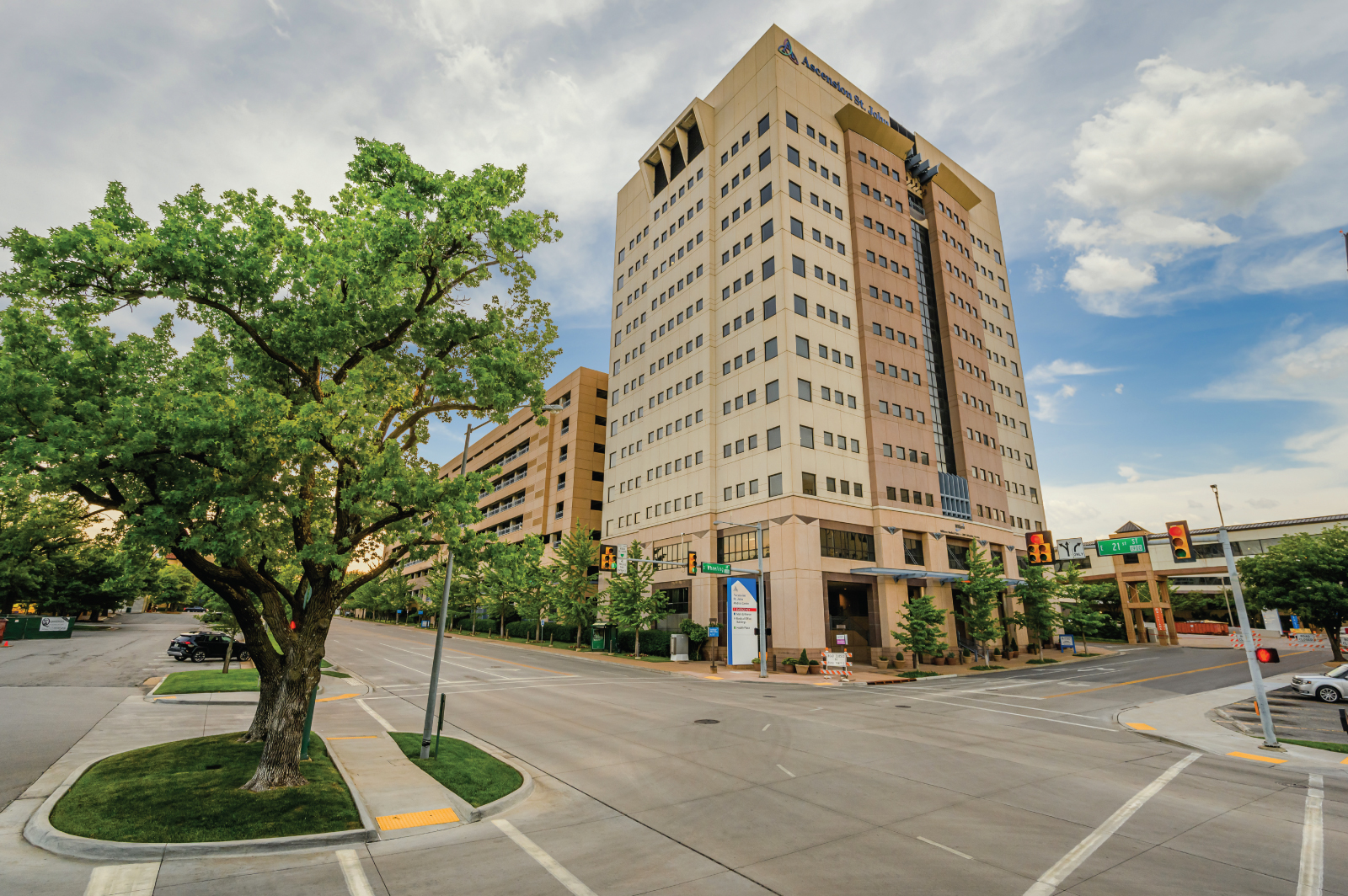
A regional leader in kidney transplant
Ascension St. John's kidney health team provides a continuum of care for patients in renal failure, including dialysis, access maintenance, and kidney transplantation. Our transplant center team coordinates both living and deceased-donor kidney transplants.
All patients must undergo a specific process in order to receive a transplant. During this process, the patient will meet with members of the team at the Ascension St. John Transplant Center located in the Xanthus Building in Tulsa, Oklahoma. Our care team will determine if you are a candidate for transplant. The patient can be discontinued at any point in the process if it is determined that the patient is not a suitable candidate for transplant. After transplant, all patients will be followed by our post-transplant clinical team for one year.
Before your transplant
Transplant referral
The transplant process starts by talking to your nephrologist for consultation about having a kidney transplant. Your doctor, dialysis center, or you can refer directly to the Ascension St. John Transplant Center. We will ensure that your health insurance coverage allows us to serve as your transplant center location. The next step is a call from a nurse transplant coordinator. The purpose of this call is both to ask and answer many questions about the transplant process and clarify any initial problems.
Pre-Transplant Evaluation (PTE)
As the evaluation continues, certain conditions or health problems may need to be corrected before the surgery can occur. Sometimes there are health problems you may have that make it too risky to have a transplant, so we try to determine these factors early. Kidney transplantation has many benefits, but it also has risks, so it is important not to cut corners in your evaluation. If transplantation is a safe and realistic option, we move on to the next step, evaluation day.
Transplant candidates are evaluated by members of the transplant team. A transplant nephrologist and a transplant surgeon will determine if you are a medical and surgical candidate. You will also meet with our social worker and receive an education session with the transplant nurse coordinator. If psychosocial issues are apparent or the patient has a history of substance abuse or other psychosocial issues, the social worker may refer the patient for a psychological evaluation and/or to a psychiatrist for medication, therapist for counseling, or both. On the day of your initial evaluation there will be a private financial discussion with a financial coordinator to ensure there are no financial barriers to transplantation.
Tests
Most of the tests performed during your evaluation period are familiar and routine: blood tests, an electrocardiogram (ECG), a chest x-ray and a CT of the abdomen. We ask that you be sure to be up-to-date on cancer screening tests like colonoscopy, mammogram and pap test (for women).
Recipient advanced screening
Routine screening may point out a need for further medical evaluation. Patients with known illnesses, such as a heart disease, will need extensive testing. Heart problems are common in people with kidney failure. We often need a cardiologist (heart doctor) to make an evaluation and assist us in the hospital. Even with the best testing, doctors, patients and families all need to be ready to cope with the possibility of an unexpected problem.
Consent for evaluation form
In your packet of information, you will find the Consent for Evaluation form. This form needs to be carefully reviewed and signed at the evaluation appointment. The transplant nurse coordinator will review the form and answer any questions. The form must be signed by both the potential transplant recipient and the transplant coordinator.
Conclusion of screening tests: Patient Selection Committee (PSC) and activation
After evaluations and testing are completed, all of your information is assembled and the transplant team meets to discuss your results. You will be informed about the outcome of the team's review soon after we meet. There are three possible outcomes from the evaluation process:
- Accepted for transplant (listed active or inactive depending on pending test results or clearances)
- Deferred acceptance for additional testing and/or other treatment recommendations
- Declined as a candidate
Next steps
When you are accepted for transplant, your financial coordinator will re-check your health insurance and request authorization when required. There are two options for a recipient to receive a transplant – living donor or deceased donor transplantation.
Living donor transplantation
If there is a donor, or several possible donors, blood tests are done with the blood of the recipient and donors. This is called Human Leukocyte Antigen (HLA) crossmatching and can be done on multiple potential donors at a time, although typically we test healthiest candidates first. In this blood test, the donor's blood cells are tested against the recipient's to determine if the recipient has any previously formed sensitivity to that donor.
When there is a reaction between the cells, and the kidney would be rapidly rejected without agressive desensitization, this is called a "positive crossmatch," and in most cases another donor must be found.
No reaction between the cells is a "negative crossmatch," meaning a transplant can safely take place. If one or more of your donors and you have a negative crossmatch, the donor who is the best match is selected to move forward with medical evaluation. The donor must also undergo thorough medical, surgical, and psychological evaluation to ensure they are a suitable candidate for living donor donation. If this person is found to be a suitable donor from a medical, surgical and psychosocial standpoint, the operation is scheduled and a date is set for the transplant. This is preceded by a final preoperative evaluation the week before surgery.
Deceased donor transplantation
Although living donor transplantation is the best treatment option for kidney failure, a transplant recipient does not always have a potential living donor. Once approved for transplant, candidates are placed on the deceased donor list. Once activated, we need to be able to reach you at any time of the day or night. It is very important for you to notify St. John of any changes to your contact information. A recipient must be ready at any time to come to Ascension St. John in Tulsa, Oklahoma, when a kidney becomes available.
Because there are so few deceased donor kidneys, we first try very hard to see if there may be someone in the recipient's life who wishes to donate. For a deceased donor transplant, special preliminary tests are done (HLA typing) to help find the right donor when the time comes. When a kidney becomes available, a final crossmatch must be done quickly a few hours before the transplant starts. This crossmatch must be negative for the surgery to take place. People waiting for a deceased donor transplant send tubes of blood to the lab every month so that this testing can be started quickly when a kidney is available.
If patients need to wait for an available kidney for over 12 months, we will schedule a repeat annual evaluation with the St. John Transplant Center to keep your information up-to-date.
After your transplant
It is extremely important that the patient keep all of his or her scheduled follow-up appointments. For the first year, the majority of the transplant patient's medical care will be at St. John Transplant Center. Â At each clinic visit, the patient will have a physical examination which will include a weight, body temperature and blood pressure. The patient will also see the post-transplant coordinator and transplant nephrologist or surgeon, and may visit with the transplant pharmacist and dietitian. The patient should plan to bring all medications with him or her each visit. The clinic appointment time is an excellent time to ask questions.
Before coming to each clinic, the patient will go to the laboratory to get blood work drawn. The number of visits per week or month will be determined by the patient's clinical status. All patient start off coming twice per week. If no complications, frequency of visits will decrease over time, all depending on the patient's status.
After each clinic visit, the patient's laboratory results will be reviewed by the post-transplant clinical team. These results could indicate that the patient's medications need to be adjusted or changed or that he or she needs to come back to the hospital. Â If either is necessary, the post-coordinator will call the patient and let him or her know.
